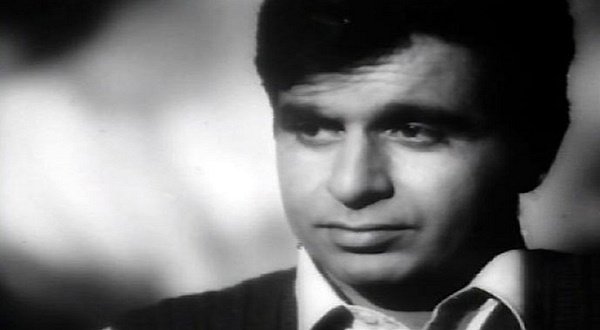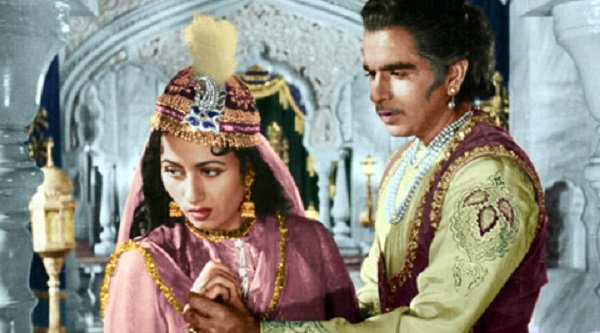
DESCRIBED BY SATYAJIT RAY AS “THE ULTIMATE METHOD ACTOR,” DILIP KUMAR’S RESUME CONTAINS MANY OF INDIAN CINEMA’S LANDMARK, GENRE-DEFINING ROLES
GITANJALI ROY
[dropcap]D[/dropcap]escribed by Satyajit Ray as “the ultimate method actor,” Dilip Kumar’s resume contains many of Indian cinema’s landmark, genre-defining roles. His performances as the drunken, doomed lover in Devdas and the rebellious royal son in Mughal-e-Azam have been endlessly referenced by his successors on-screen. In Madhumati, he set the trend for reincarnation films. In Ram Aur Shyam, he established the twins-separated-at-birth formula. He became the first ever winner of the Filmfare Best Actor award for Daag in 1954 and went on to win the award another seven times. Just one other actor has equaled Dilip Kumar’s eight Filmfare wins – Shah Rukh Khan, who has often cited the older actor as his inspiration.
Born Yusuf Khan in Peshawar on December 11, 1922, the young Dilip Kumar went to school in Deolali, Maharashtra, where his fruit merchant father owned orchards. In 1940, Dilip Kumar moved to Pune and set up shop supplying dry fruits and running a canteen. Three years later, actress Devika Rani and her husband actor-director Himanshu Rai spotted him in a military canteen and cast him as the lead in 1944’s Jwar Bhata. Author Bhagwati Charan Varma changed his name from Yusuf Khan to Dilip Kumar and the young actor took his first tentative steps towards stardom.
Jwar Bhata, however, sank without a trace at the box office, as did his next film Pratima. Then his luck turned with 1947’s Jugnu, which co-starred actresses Noor Jehan and Ruby Myers and a little known Mohd Rafi, later to become one of cinema’s most legendary voices. After the success of Jugnu came 1948’s patriotic-themed Shaheed. Then, in 1949, the breakthrough Andaz, co-starring Raj Kapoor and Nargis, made Dilip Kumar a star.

A series of dramatic roles followed in Deedar (1951), Daag (1952), Devdas and Azaad (1955). In 1958, he starred with actress Vyjayanthimala in the reincarnation and revenge themed Madhumati. In the epic Mughal-e-Azam (1960), he played Prince Salim battling his father, Emperor Akbar, to save his romance with the dancing girl Anarkali. Crowned Bollywood’s ‘Tragedy King,’ Dilip Kumar was famously advised by his doctor to switch to lighter fare, which he did with great success in films like Aan (1952), Azaad (1955) and Kohinoor (1960). In 1957’s Naya Daur, Dilip Kumar played a tongawalla dealing with industrialization in independent India. In 1961, he produced and starred with his brother Nasir Khan in Ganga Jamuna. In 1967, he played a double role in Ram Aur Shyam, the film that inspired later blockbusters Seeta Aur Geeta and Chaalbaaz.
During this period, Dilip Kumar reportedly refused the role of Sherif Ali in David Lean’s Lawrence of Arabia, which was then played by Egyptian star Omar Sharif. In the ’70s, Dilip Kumar’s career slumped somewhat in the wake of Rajesh Khanna’s superstardom and the rise of Amitabh Bachchan’s Angry Young Man.

After a five year break, Dilip Kumar returned to celluloid in the superhit Kranti (1981) as part of an ensemble cast featuring Manoj Kumar, Shashi Kapoor, Hema Malini and Shatrughan Sinha. He then switched seamlessly from playing the hero to supporting roles, starring in acclaimed films such as Ramesh Sippy’s Shakti (1982), Yash Chopra’s Mashaal (1984) and Saudagar (1991) in which he co-starred with Raaj Kumar and Manisha Koirala. 1998’s Qila marked his last appearance on-screen.
During his career, Dilip Kumar formed hit partnerships with actresses Vyjayanthimala, Madhubala, Meena Kumari, Kamini Kaushal and Nargis. Mohd Rafi often sang playback for him, as did Mukesh, Talat Mehmood and Kishore Kumar.
An alleged romance with co-star Madhubala is the stuff of Bollywood legend, with a planned secret marriage reportedly being nipped in the bud by the actress’ disapproving father. In 1966, Dilip Kumar married actress Saira Banu, his co-star in films like Gopi and Bairaag.
In 1991, Dilip Kumar received the Padma Bhushan, India’s third-highest civilian award. In 1994, he received the Dadasaheb Phalke Award. In 1998, Pakistan awarded him the Nishan-e-Imtiaz, an honour he retained in the face of shrill objections from Bal Thackeray’s Shiv Sena. He was also nominated to the Rajya Sabha for a term.–Courtesy NDTV.com

